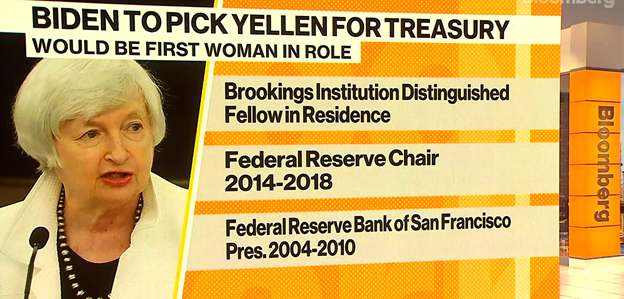The market likes President-Elect Joe Biden’s selection of Janet Yellen to serve as Treasury Secretary. Many Wall Streeters feared that Biden would appoint Elizabeth Warren, while many progressives feared he would appoint someone too friendly to big banks and the wealthy.
According to Bloomberg:
Yellen faces severe conditions, as COVID-19 infections continue to soar and the number of Americans in need of immediate financial help soars right along with it. As Bloomberg points out, her most immediate challenge is “breaking a logjam on Capitol Hill to deliver economic relief to long and growing unemployment lines.”

Janet Yellen certainly comes to the position with a surfeit of credentials. She earned her Ph.D. in economics from Yale, taught at Harvard, and as early as 1977 joined the staff of the Federal Reserve Board in Washington. During the Clinton administration, she was the head of the Council of Economic Advisors. She then became the president of San Francisco’s Federal Reserve Bank.
In 2014, President Obama appointed Ms. Yellen to serve as the first woman to chair the Federal Reserve.
She will now bring this experience and background to tackle the problems of unemployment and perhaps slowing economic growth—both sparked by the virus.
Yellen’s appearance on CNBC’s Squawk on the Street is likely the real reason for Mr. Market’s excitement. She said: “It would be a substantial change to give the Federal Reserve the ability to buy stock.”
And she said:
“I frankly don’t think [Fed stock ownership] is necessary at this point. I think intervention to support the credit markets is more important, but longer term it wouldn’t be a bad thing for Congress to reconsider the powers that the Fed has with respect to assets it can own.”
We can only say: When the Federal Reserve starts buying stock, free market price discovery goes out the window.
Meanwhile, the bulls are roaring their approval of one of Biden’s most important appointments.
“When the facts change, I change my mind.
What do you do, sir?” ~ John Maynard Keynes
Our plan is “the plan will change.”
What is your plan?
Relative strength measures the price performance of a stock against a market average, a selected universe of stocks or a single alternative holding. Relative strength improves if it rises faster in an uptrend, or falls less in a downtrend. It is easily applied to individual positions in your portfolio and to sectors and asset classes.
A copy of our form ADV Part 2 is available online.
Investor Resources, Inc. only transacts business in states where it is properly registered or notice filed, or excluded or exempted from registration requirements. Follow-up and individualized responses that involve either the effecting or attempting to effect transactions in securities, or the rendering of personalized investment advice for compensation, as the case may be, will not be made absent compliance with state investment adviser and investment adviser representative registration requirements, or an applicable exemption or exclusion.

